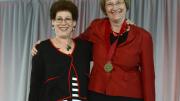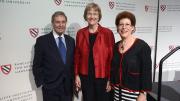In 1964, when Drew Faust entered Bryn Mawr, she was not allowed to wear pants to class or dinner, and strict curfews kept her in her dorm room most nights, a constant reminder that she, like all her women peers, “should be bearers of virtue.”
“The more than 40 years since I have graduated from college represents a cultural eternity,” Faust said on Friday afternoon as she stood at the podium after receiving the 2014 Radcliffe Medal from Radcliffe Institute for Advanced Study dean Lizabeth Cohen. “The past century has brought extraordinary progress for American women, and Radcliffe has both represented and propelled that change. Had I said when I was 10 years old that I would be the president of Harvard, people would have said that I was deranged.”
Faust spoke to a packed audience of scholars, alumni, faculty, and staff gathered under a tent in Radcliffe Yard to celebrate Radcliffe Day 2014. She focused on the history and future of women’s rights in the United States and globally, stating that it is critical to remember those who knocked down significant barriers in order to make our current world possible. Women’s rights have come a long way since her birth in 1947, Faust said, but she worries that there is now a sense of complacency in our society about the place of women—a complacency that “too easily forgets that things were once otherwise.”
“Today as we celebrate Radcliffe, I remember Justice O’Connor standing on this platform five years ago, recalling how she could not get a job as anything other than a secretary, even as she graduated third in her class from Stanford Law School,” Faust said. “She became the first female Supreme Court justice, despite having, as she has called it, ‘the debilitating medical condition of having two X chromosomes.’”
Faust also recited a favorite quotation from Nora Ephron: that one of the ways in which women are secretly luckier than men is that “they are able to reinvent themselves.” “Can we still claim that capacity?” Faust asked. “Here we are,” she continued. “Now what do we do?”
Despite remarkable breakthroughs for women, Faust said, many limits still exist, especially in politics, the workplace, and even on college campuses. “Here at Harvard, and on campuses around the country,” Faust said, as an example, “we are deeply concerned about sexual assault—about how to ensure the fundamental safety that is the necessary foundation for inclusion, and justice, and equality.” As another example, she asked: “In the workplace, do women need to do more leaning in, or do institutional leaders need to change the 80-hour work weeks that are pushing back?”
Faust recalled her very first Radcliffe Day in 2001, when she listened to then U.S. Secretary of State Madeline Albright, LL.D. ’97, recall how the clicking sounds in classrooms formerly didn’t come from laptops, but from knitting needles, and how she could never have imagined that she might rise to her position, because “she had never seen a Secretary of State in a skirt.” “Here we are 13 years later, and two female secretaries of state later, happily taking that possibility for granted—and no one is talking about wearing, or not wearing, a skirt,” Faust declared. “So how good it is to be free to forget, yet how dangerous forgetting can be.”
Faust discussed how the Schlesinger Library—just 50 yards from her podium—is a vital way to remember the past of American women, as it houses everything from documents on the woman’s suffrage movement, to Julia Child’s 5,000 cookbooks, the robin’s-egg blue desk of Dorothy West, and the papers in which Charlotte Perkins Gilman addressed discrimination by advocating kitchenless homes. By remembering the past, Faust said, we can better see the present and the future of women as part of a larger story—“beyond our shortsightedness and immediate concerns.” The result of better equality, she said, is not to take what has been given to us for granted, or to let successes and opportunities blind us from a reality “sharply different” from our own.
“As I came up to each choice in my life, somehow a door seemed to open, and I would step through on a path that somehow a generation before would have been unimaginable,” she said. “But those opening doors were not miracles, blown outward by a faceless wind. I knew it then, and I know it better now: those doors were stormed and broken down by a lot of brave, determined, and visionary people.”










